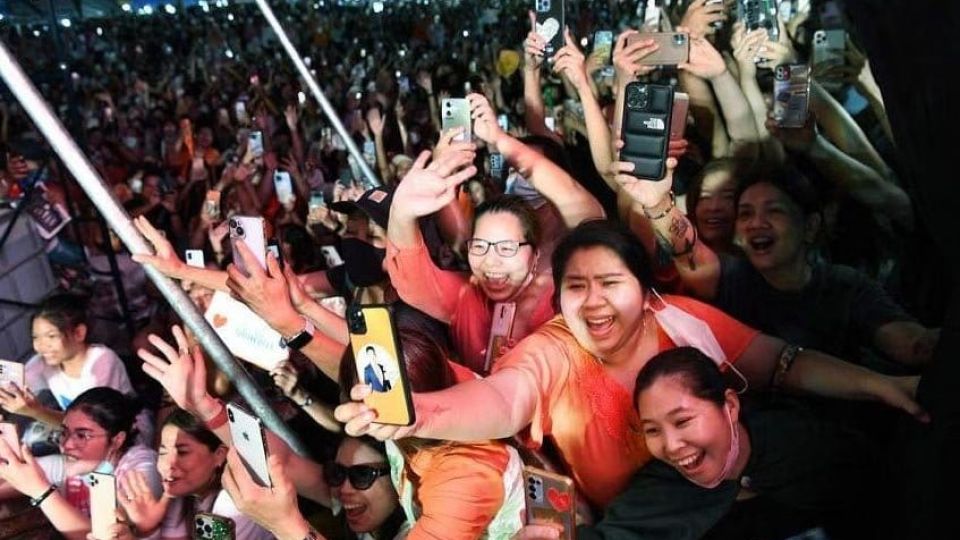May 11, 2023
BANGKOK – How many functions does a pha khao ma, the Thai-style traditional loincloth, have?
According to Move Forward Party leader Pita Limjaroenrat, there are seven, and he beams as he demonstrates on a TikTok video how the colourful woven cloth can serve as a belt, a towel and a makeshift seat.
The progressive party leader’s video has been viewed 13.1 million times with 1.3 million “likes” since it was posted in February, making it the most-watched clip on the party’s official TikTok account.
With 2.2 million TikTok followers and millions more on other platforms, Move Forward leads the pack of Thai political parties in campaigning on social media.
The opposition party has been mentioned over 1.4 million times on platforms including Facebook, Twitter, Instagram and YouTube, according to data compiled by news agency The Nation.
@mfp.official #พิธา พรรคก้าวไกลขอสาธิตสารพัดประโยชน์ของผ้าขาวม้า แบบสับ แบบใหม่ ยิ่งกว่ากระเป๋าวิเศษ . หยิบผ้าขาวม้าเมื่อไร นึกถึง #พรรคก้าวไกล ♬ Dj Zombie Thailand Style (Remix) – PWMUSIC PROJECT
Since early March, it has been the most talked about party. The United Thai Nation (UTN) Party that is backing incumbent Thai Prime Minister Prayut Chan-o-cha for a third term has about one million mentions, while Pheu Thai, the largest opposition party, has around 600,000.
Social media has proven to be a powerful tool globally in canvassing for votes, and it is no longer just the youthful Move Forward Party that has capitalised on online campaigning, said Assistant Professor Sakulsri Srisaracam, who specialises in digital media at Chulalongkorn University.
“In this election, communication on social media has become the norm. Parties are putting out more creative and professionally done videos and content,” she said.
Parties across the spectrum have invested in sleek social media content to put forward their political stand and policy promises. And with just days till the election on Sunday, they have been publishing these messages at feverish speed.
On May 5, the UTN shared a six-minute clip on Facebook in which a casually dressed Mr Prayut discusses his childhood, family and personal life, presenting a more affable side of the former coup leader who has often been criticised as mercurial and unfriendly by the press.
In the video, Mr Prayut, 69, shares tidbits of information about himself, such as how he used to support English football club Manchester City and has watched popular Korean drama Descendants Of The Sun.
Two days later, the Pheu Thai Party launched an 18-minute documentary on its most popular prime ministerial candidate Paetongtarn Shinawatra. The 36-year-old is one of three PM candidates backed by the party, with the other two being property development tycoon Srettha Thavisin, 60, and party strategist Chaikasem Nitisiri, 74.
The clip details her journey as the daughter of ousted former prime minister Thaksin Shinawatra, her professional life as a senior executive in her family’s hospitality firm, and her 2021 entry into politics.
Pheu Thai has been leaning heavily on the Shinawatra brand name, with Ms Paetongtarn leading its election campaign despite being a political novice.
“It’s about making themselves more relatable and closing the gap between politicians and people,” said Dr Sakulsri.
With the election expected to be a showdown between the conservative incumbents and the more liberal opposition parties, all sides are pushing out rhetoric to influence voters.
A short clip posted by the UTN asks voters if they really want Thailand to change, and paints a dire picture if alternative policies are adopted. The video shows Thailand being invaded after mandatory military conscription is scrapped. It also has a scene in which a son gets upset at what his mother serves at meal time, as he did not get to vote on the menu.
While the video did not name any parties, analysts interpret it as an attack on the main opposition parties, Pheu Thai and Move Forward, which support the end of compulsory military service. Move Forward has also promised to amend Thailand’s controversial lese majeste law, which forbids any insult to the monarchy.
Both opposition parties have been leading the latest popularity polls, with Move Forward’s leader Pita enjoying a late surge in support for the position of prime minister.
In the UTN video, the party says there is “a high risk” of the hypothetical scenarios becoming reality, adding that the election will decide if Thailand will “move forward steadily and with unity”, as it did in the past eight years under Mr Prayut, or “be dragged into the black hole of conflict”.
“Those who think differently will uproot the culture, traditions, and good values of society. Thailand won’t be the same anymore,” it goes on.
The video is a stark departure from the UTN’s usually positive take on Mr Prayut’s accomplishments and vision for Thailand, said political analyst Ken Mathis Lohatepanont.
“What is surprising is how emotionally charged this video was,” he added, and suggested that the clip makes the party look divisive and conspiratorial.
While the video has drawn flak from opposition supporters, it is clearly targeted at the conservative base, said Mr Ken. He does not think the message will expand the UTN’s voter base, and it is perhaps a strategy to motivate supporters to head to the polls on Sunday.
Agreeing, Dr Sakulsri said that the last stretch of campaigning is not about increasing support, but for parties to cement their message and positions. Major political parties are set to make their last pitches at big rallies across Bangkok on Friday, two days before the election.
Warning that political messages and discourse might get more heated as the polls edge closer, she said: “Voting can be confusing for some people. But if parties make clear their position now, you assure your supporters that they have chosen the right party.”
Correction note: In an earlier version of the story, we said that Assistant Professor Sakulsri Srisaracam is from the Panyapiwat Institute of Management. This is incorrect. She is from Chulalongkorn University. We are sorry for the error.


